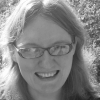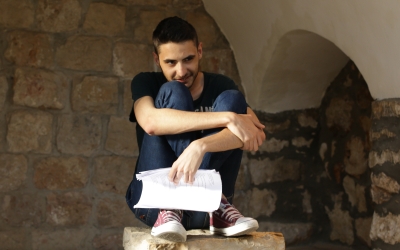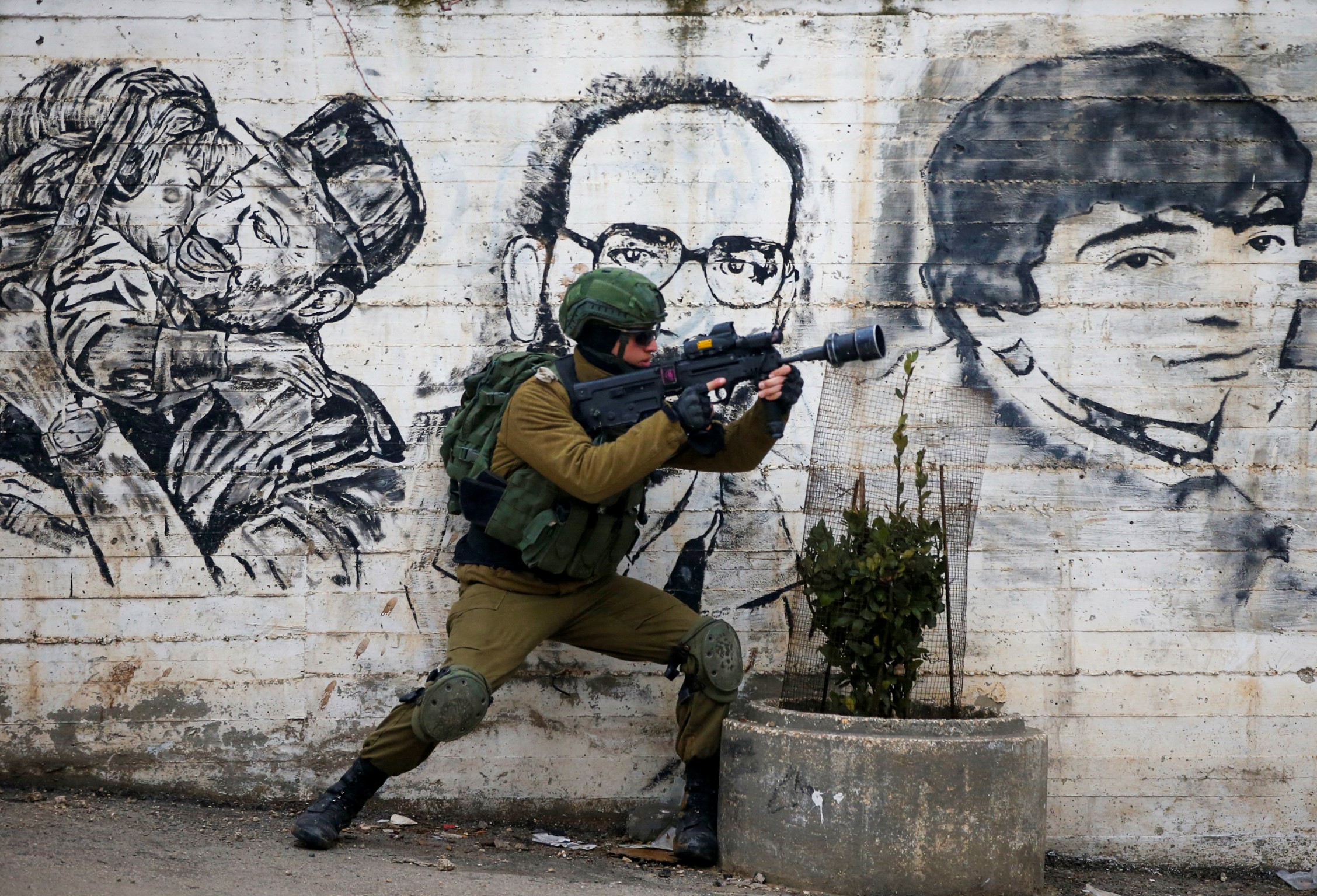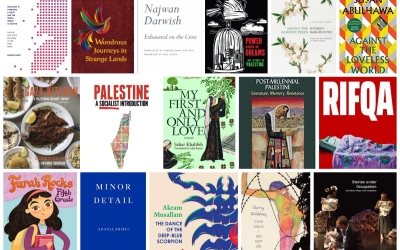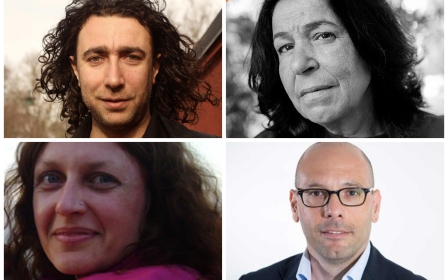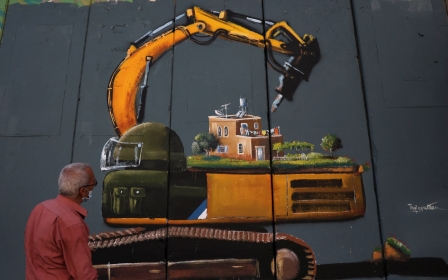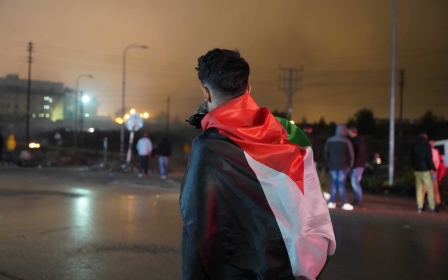Mohammed El-Kurd: Palestinian poet distils lessons from injustice
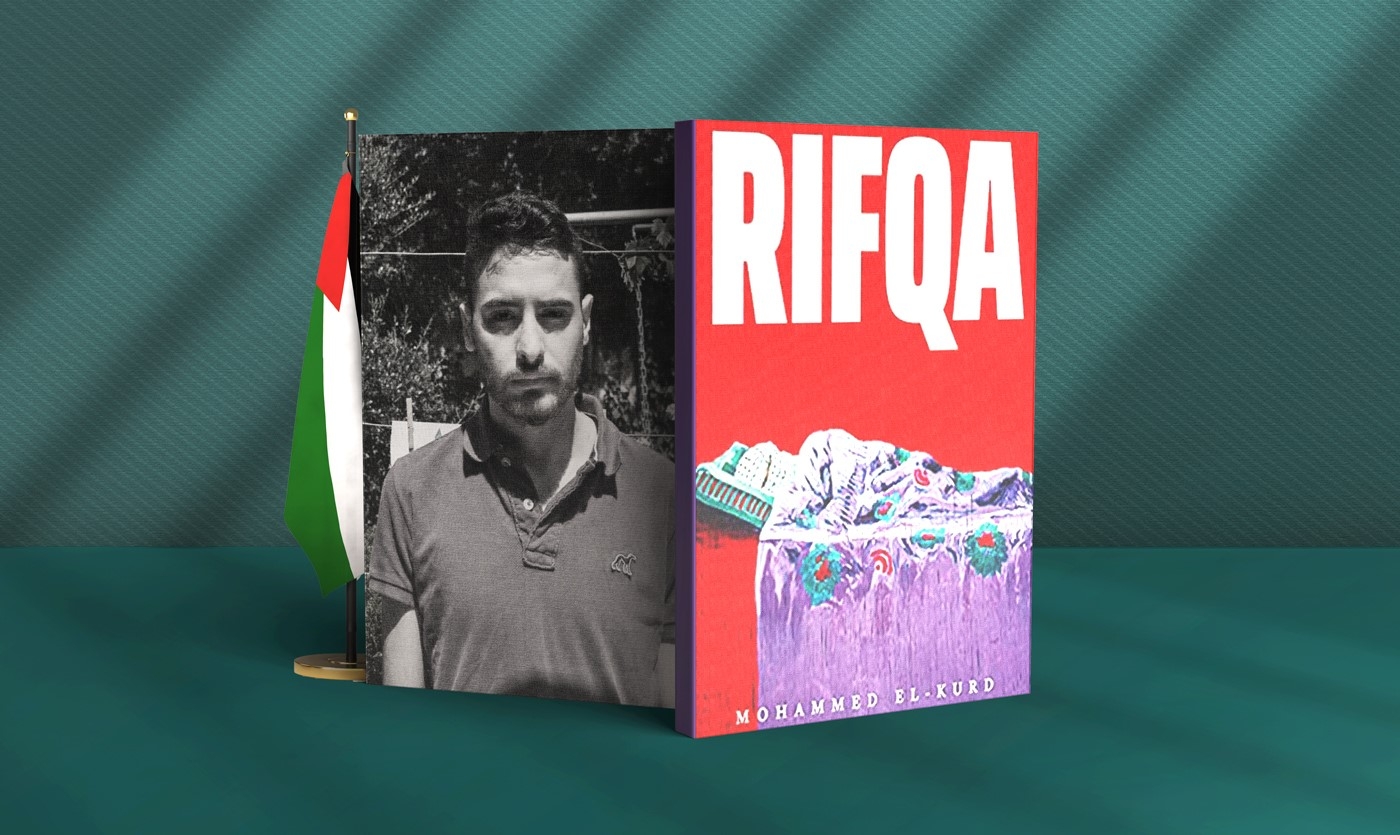
Born in the Sheikh Jarrah neighbourhood of occupied East Jerusalem, Palestinian poet Mohammed El-Kurd rose to international fame amid this year’s Israeli assault on Gaza and East Jerusalem. Although his credentials as a writer and activist have long been known to followers of Palestinian politics, his debut collection, Rifqa, introduces us for the first time to a poet of global stature.
The poems are innovative in form, sound and content. Free verse and prose poetry alternate with poems in which words are spread across the page and positioned at odd angles to each other, as if to knock readers out of their comfort zones. The poems explode with righteous anger when the poet chronicles familiar forms of discrimination:
This graphic depiction of American violence is a searing indictment of the same form of oppression that effects Palestinians
My name: a bomb in a white room,
a walking suspicion
in an airport,
New MEE newsletter: Jerusalem Dispatch
Sign up to get the latest insights and analysis on Israel-Palestine, alongside Turkey Unpacked and other MEE newsletters
So much is packed into these words, including unexpected collocations such as “walking suspicion” and “choiceless politics”. The latter is a dramatic political statement, and a testimony to the narrow horizons many Palestinians face.
Other poems are elegiac, as in the memorably titled “Bulldozers Undoing God”:
In Jerusalem, every footstep is over a grave.
This was only love:
her skeleton is that of the tree’s
roots stitched into land into identity
separation is like
unmaking love
ungluing names to places
undoing God.
Creative genius
These verses showcase Kurd’s creative genius, as he brings together unexpected images (“unmaking love” and “undoing God”) and introduces new parts of speech.
Kurd’s poetics draw on the rhythms of spoken English as well as Arabic. Several of the poems in this collection were first released as part of the poetry and oud album Bellydancing on Wounds (2019).
Those who turn to Kurd’s book in search of insights into the Palestinian experience of occupation will not be disappointed. In the poem “Rifqa”, for which the collection is named, we read of the poet’s grandmother, who “was chased away from the city, leaving behind the vine of roses in the front yard”.
As he comes of age as a poet, Kurd positions himself in his grandmother’s shadow. After noting that Rifqa stopped being a poet at a time in her life “when youth was more than just yearning”, he emerges as her successor, but cites his failure to live up to her standards: “What I write is an almost. I write an attempt.” Kurd’s literary world is shaped by women, including his mother, poet Maysoon Abu Dweih El-Kurd, with whose verse the collection opens.
Like countless other Palestinians, Rifqa left her entire life behind when she was forced to leave Haifa during the Nakba. “Her suitcase did not declare departure,” Kurd writes. Believing that she would return eventually to her home, Rifqa “wore her key” until it matched the colour of her memory.
The language of humanism
While these poems are deeply immersed in the Palestinian experience of occupation, they are not limited to that theme. We read of homelessness in Atlanta, Georgia - where Kurd lived while studying for his BA - and of the African American quest for freedom through the eyes of writer James Baldwin, to whom Kurd compared his grandmother: “much like James Baldwin, who could not live six decades more to the see the ‘progress’ he was constantly promised, ‘progress’ has taken more than my grandmother’s time”.
“Things I Cannot Say” was written in memory of the Afghan civilians murdered by American soldier Jeremy Morlock a decade ago. Capturing in a few devastating words the American approach to waging war, Kurd reimagines the scene of the routine massacres performed by the US military stationed in Afghanistan, for whom pavements were tiled:
like a board game
or some sort of mundane, alleged raillery,
and “national heroes” roll dice
roll corpses
after posing with them
This graphic depiction of American violence is a searing indictment of the same form of oppression that affects Palestinians, and which calculates some lives as being more valuable than others.
Kurd’s poetry indicts the many forces standing in the way of Palestinian liberation in the language of humanism, or what postcolonial theorist Paul Gilroy would call “strategic universalism”. This concept means that we must recognise our shared humanity in order to forge networks of solidarity, rather than isolate ourselves due to our differences.
Like other Palestinian poets, from Fadwa Tuqan to Rashid Hossein to Mahmoud Darwish, Kurd has a significant role to play in forging an international front against settler-colonialism and imperialism around the world.
Political consciousness
Kurd opens his afterword, which chronicles his coming of age as a poet alongside his awakening political consciousness, with the words of Palestinian resistance writer Ghassan Kanafani, who was assassinated by Mossad in 1972: “After all, in the final analysis, man is a cause.” These words, taken from Kanafani’s novella Returning to Haifa (1969), capture well the humanist convictions that underpin Kurd’s poetic vision. Making humans the cause means putting them before politics, since politics can only derive its meaning and purpose from the human condition.
Kurd also recognises the limits of humanism. Of his grandmother Rifqa, who passed away at the age of 103 not long before this book was published, Kurd insists she “refused to be a humanitarian case for gazing eyes”. When humanism slides into humanitarianism, it can become an instrument of exploitation. Kurd’s poems train us to recognise this trend and to resist it.
Alongside these chronicles of global injustice, we read of poetry at - and beyond - its limits
Alongside these chronicles of global injustice, we read of poetry at - and beyond - its limits. In lines that simmer with anger and brilliance, Kurd writes:
So many poets
break their lines with threats of triggers
break their lines with cliffs.
Poets break their necks below cliffs.
Many find refuge in rifts.
As suggested by the image of a poet with their neck below a cliff, the basic plotline of “No Poetry in This” is a chronicle of a poet’s suicide. And yet, the poem’s primary aim is to delve into the spaces where poetry is not, and to discover, with brutal honesty, what poetry can and cannot achieve, and where it falls flat.
As Kurd writes, there is “no poetry in suicide and no poetry in cigarettes”. In part, he is right. Yet at the same time, his own words belie this axiom: they generate beauty from the direst circumstances and the deepest tragedies.
Life-changing inheritance
Even as he writes from within the occupation, Kurd is acutely conscious of what separates him from Palestinians residing in the occupied West Bank and besieged Gaza. “Boy Sells Gum at Qalandiyah” is a prose poem focused on the life of an eight-year-old boy who passes his days at Qalandiyah checkpoint, not far from East Jerusalem, waiting for passers-by to purchase his gum.
The distance between the poet and his subject is progressively revealed as the poem moves forward. Kurd reflects on how the boy’s life has been wasted on the empty labour of selling gum at a checkpoint. The poem concludes with an exchange between the poet and the boy, which underscores all that separates them from each other, despite their geographic proximity. “I drive by. I roll down my window. I buy what I can,” the speaker reports. Unable to hold back, he tells the boy to stop selling gum.
Whereas up to this point we have been viewing the scene through the speaker’s eyes, the boy’s angry reaction disrupts this. Suddenly, we see the boy on his own terms. The boy tells the speaker that he “doesn’t know a thing” about his life, including what compels him to sell gum at the checkpoint. The boy’s rebuke shocks the speaker, forcing him to think differently about his own circumstances as a relative outsider, a Palestinian from Jerusalem who visits the West Bank checkpoints from the comfort of his car.
In a tone of self-condemnation, the speaker then produces his own variation on the boy’s words: "Don’t know a thing about the sun’s fingernails clawing the back of his neck. I’ll be quiet then. I don’t know a thing, truly, Not a man yet. Not a man often." This terse dialogue is an indictment of poetry itself, and of its inability to rectify all injustices.
Highly introspective and self-aware, Kurd’s poems reveal a poet who looks critically at himself and who recognises his own position within the machinery of occupation, while also exposing its brutality. Remarkably for someone his age (23 years), Kurd speaks as a mature poet who has absorbed the brutality of occupation, carried poetry to its limits, and lived to tell the story.
Rifqa is a gift. As a Palestinian friend said to me, it brings joy to anyone who despairs of being able to put suffering into words and to distil lessons from atrocities.
Although it is impossible to downplay what the Palestinians in Kurd’s book have endured throughout the many decades of their perpetual dispossession, the poetry extracted from these traumas can be a life-changing inheritance.
We should be grateful that this is Kurd’s first book rather than his last, and that we can look forward to many decades of poetic innovation from this extraordinarily multifaceted and politically engaged poet.
The views expressed in this article belong to the author and do not necessarily reflect the editorial policy of Middle East Eye.
Middle East Eye delivers independent and unrivalled coverage and analysis of the Middle East, North Africa and beyond. To learn more about republishing this content and the associated fees, please fill out this form. More about MEE can be found here.


